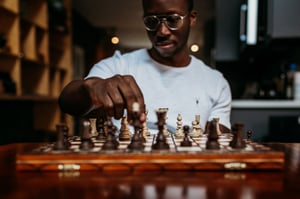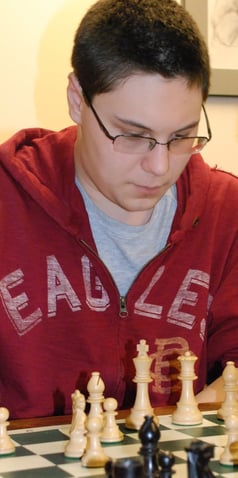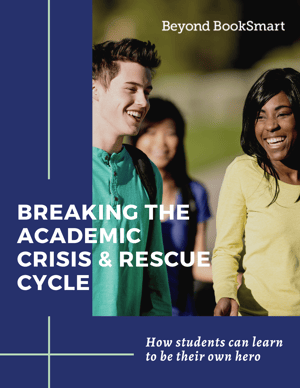The ongoing pandemic has provided infinite opportunities for discovering (or rediscovering) new activities to  keep us occupied in a COVID world: the joy of baking banana bread, learning a new instrument, decluttering long-neglected areas of our homes - and, more recently, the mental workout of playing chess. Thanks to the popular Netflix series “The Queen’s Gambit,” chess has enjoyed a resurgence in popularity. And unlike the extra pounds you may be carrying from those kitchen endeavors, it turns out that chess is one of those “good for you” activities - especially when it comes to building Executive Function skills.
keep us occupied in a COVID world: the joy of baking banana bread, learning a new instrument, decluttering long-neglected areas of our homes - and, more recently, the mental workout of playing chess. Thanks to the popular Netflix series “The Queen’s Gambit,” chess has enjoyed a resurgence in popularity. And unlike the extra pounds you may be carrying from those kitchen endeavors, it turns out that chess is one of those “good for you” activities - especially when it comes to building Executive Function skills.
One study covered in Healthline found that chess players enjoyed sizable improvements in memory, creativity, strategic planning, and even ADHD symptoms. It got me wondering about how much playing chess can actually improve other aspects of your life, especially given my own recently discovered passion for playing the game. Even though there’s plenty of research on the subject, what could be better than diving into an expert’s personal perspective?
Recently, I spoke with Jesse Nicholas - Beyond BookSmart coaching alumni, professional television writer, and - most important of all - a nationally titled chess master. In this article, we’re going to cover the top 4 insights I learned from talking to Jesse about his chess career, academic struggles, and coaching experience. In doing so, we can gain a clearer understanding of the benefits of chess as they relate to Executive Function (EF) skills and personal growth.
Insight 1: Chess Strengthens Critical Thinking and Meta-Cognition
The research is clear - chess has a proven ability to strengthen both critical thinking and meta-cognition (i.e. awareness and understanding of one’s own thought processes.) Although we’ll cover a number of other perks, these are two of the most bang-for-your-buck EF benefits. as just playing one game will give these skills a strenuous workout. But why are they so important to develop in the first place?
 No matter your age, profession, or ambitions, critical thinking and meta-cognition will be fundamental to success. Together, they enable us to set goals, solve problems, make good decisions, and maintain emotional wellbeing. And, of course, they’re also critical to success on a chess board.
No matter your age, profession, or ambitions, critical thinking and meta-cognition will be fundamental to success. Together, they enable us to set goals, solve problems, make good decisions, and maintain emotional wellbeing. And, of course, they’re also critical to success on a chess board.
“Chess is a game of strategy and tactics,” Jesse points out. “Tactics are the decisions made move-to-move to win pieces or advance your position, whereas strategy is the big picture plan you have to win. In both cases, players must carefully analyze the board and their opponent's move to determine the best response.”
This level of constant analysis is the main reason chess is such a challenging, but cognitively rewarding, game. At the level Jesse plays (among the top .1% of all players,) his analytical skills keep him thinking multiple steps ahead of what’s currently on the board. He offered a remarkable view into his thinking: “As you improve at chess, you start coming up with ‘candidate’ moves for your pieces each turn, which are essentially different options for where to go.” He continues, “To choose the ‘best’ move, I’ll calculate how my opponent might respond to each possibility, how I'd respond to that move, and so on, as far as I can see ahead before choosing the move I feel most confident about. And last but certainly not least, I’ll do one last check for any obvious mistakes before moving.”
Although the best chess players can regularly calculate well past 10 moves ahead, your typical beginner might struggle to even think about the next move, let alone what comes after. Even so, the more you play, the farther ahead you can think. For the average beginner, Jesse recommends the following: “Win or lose, as long as you stay patient and think through each move carefully, you’ll start improving over time and strengthening your analytical skills. If you rush and make impulsive decisions, you’re bound to get punished.”
Insight 2: Chess Reveals the Best Way to Approach Failure
Failure is essential to success. Although a big win provides a surge of satisfaction, it’s all the more fulfilling when there’s been a couple defeats along the way. There may be no better example of this than chess. Regardless of how skilled a player is, they will eventually lose - and that inevitable loss always stems from a couple of errors they made along the way. In other words, there’s no excuses, no finger pointing, and no one to cast blame on - your decisions alone determine the outcome.
“After losing a game, there’s only so much you can do,” Jesse explains, “It’s a waste of energy to wallow. Instead, figure out what went wrong and work to correct it for next time.”
Jesse believes there’s also a sense of empowerment that comes from the revelation that you’re in control: “Unlike Scrabble where you may have gotten some bad tiles, you can always learn from the mistakes you made in a chess match, and there’s something kind of motivating about that.”
In my own journey as a novice chess player, I used to regularly leave pieces unprotected, allowing my opponent to take them with no consequence. After some tough defeats, I've trained myself to carefully scan the board before moving any piece to ensure I’m not about to give something away. This simple impulsivity-check has made me improve more than anything else, leading to many more wins and more interesting games. As Jesse reminded me, “There’s a new lesson from every game, regardless of skill level.”
As we chatted about his extensive competitive chess career - one that’s spanned nearly 2 decades and 600+ tournaments - it became clear that this mindset is universal among the higher tiers of competitive players. “After most tournament games, your opponent will be eager to go over the game with you,” Jesse explains. “Those are the best learning opportunities from tournaments - you have a chance to get inside the head of someone who just beat you and keep something for future games.”
Translate this mindset to tests and papers at school, and it’s clear to see how reviewing a graded assessment can help a student take ownership of their performance and gain strategies to improve their outcomes.
Insight 3: Chess Showcases the Complexities of Selective-Attention
Attention is a paradoxical cognitive ability. We may find ourselves capable of spending countless hours on an activity we enjoy, only to feel powerless to dedicate just 5 minutes to a different task that we find boring. For those with ADHD and/or Executive Function challenges, this can be a frustrating day-to-day reality that can have real consequences. Yet, it can also be a remarkable source of confidence as well.
In the case of Jesse, chess is the perfect example of this selective-attention paradox. As I learned, he competed in a chess tournament every weekend during middle school - a time consuming affair that requires meticulous focus for many hours at a time. Despite the excessive mental and physical energy these tournaments require from players, Jesse excelled week after week, eventually earning him a spot among the top-10 youth chess players in Massachusetts. However, while he was experiencing remarkable success over the chess board, problems were brewing in school.
"Even though I could focus for 5 hours at a time on stressful chess matches, I couldn’t get myself to sit down for 5 minutes to work on an essay,” Jesse shared. “And even if I could, I had no idea where to start. My inability to focus had a sort of cascading effect in school.” Jesse continues, “Since I couldn’t get myself to sit down and work, I started having a lot of anxiety at school over the assignments I was given. That anxiety made it even harder to start, which of course made me even more anxious about going to school. It was a vicious cycle that felt out of control.”
While school was challenging, Jesse’s continued excellence in chess tournaments offered a ray of hope: “Chess and school were two different worlds for me.” he reflects. “It really showed the duality of the problem. I knew that if I could focus for so many hours under pressure in chess that I was capable of focusing on schoolwork - I just had to learn how to harness that ability.”
Too often, students wrongly internalize their challenges at school as character flaws. But as Jesse’s relationship with chess illustrates, non-academic passions can provide an incredible opportunity for students to disprove those skewed judgments and gain confidence. From there, they just need to learn how to leverage that confidence in school. Which leads us to our final insight….
Insight 4: Chess Works in Tandem with Coaching
Despite all of the successes Jesse enjoyed from chess, it wasn’t until he began coaching that he could truly apply those abilities toward his schoolwork. When I asked him about the most important skill to succeed in chess, as well as the most substantial benefit he gained from coaching, the answer was the same: the ability to organize thoughts.
“I’ve realized that coaching and chess work the same muscles.” Jesse continues, “Both require you to take a step back and assess how you think, and then use that insight to organize your thoughts to reach a goal. That’s something inherent about chess, but it’s also something inherent about coaching, too.”
Although well-organized thinking ultimately helped Jesse overcome his school challenges, it wasn’t until he applied it towards smaller goals that the lesson solidified. Essays, for example, were one area he regularly struggled with prior to coaching, as he didn’t know the best way to organize information in order to create an argument. Because of this, even writing that first sentence became an impossible and anxiety provoking task. “Part of the problem I had with essays was not knowing how to prioritize which information to include,” Jesse said. “This would cause me to waste time writing stuff that didn’t actually strengthen the thesis.”
Luckily, Jesse’s coach knew just the approach to help him succeed. “Right from the beginning, my coach showed me how to organize information into a workable outline that would keep me on track.” He continues, “I also learned how to make a plan for getting the assignment done on time by breaking the whole thing into smaller chunks.” Although this was an uncomfortable change at first, Jesse soon couldn’t imagine doing it any other way - especially during his time as a student at Boston College, and particularly now that he works as a full-time television writer.
Writing prowess was just one of the many benefits Jesse shared with me from his coaching experience, but it was the one he found the greatest cross-benefit with chess. “In many ways, the satisfaction you get from seeing a well-thought-out outline turn into a finished piece of writing is the same as watching a plan you have in a chess match unfold into a victory. In both cases, you get to watch your organized thoughts transform into something tangible that you can feel proud of.”
The Takeaway
The cognitive discipline of playing chess makes it a powerhouse for developing EF skills. And with expert guidance, those skills can transfer to both school and life beyond. On top of building EF skills, chess also has some clear benefits to personal growth, as well. Regardless of your experience (or inexperience) with the game, give it a try. Chess.com is a great spot to get started. And who knows? You may just find that it’s something you really enjoy. Even in defeat, remember that your brain still wins because it's flexing those Executive Function muscles - and that’s the real checkmate.
Also, if you're feeling brave and want to challenge Jesse to a match, or simply want to check out his recent games to see how a National Master plays, you can visit his Chess.com profile here. And to those brave souls interested in challenging him.... good luck!
Top photo by ConvertKit on Unsplash
 Our detailed guide reveals how and why students get stuck in academic crisis cycles, which can leave them dependent upon an adult to rescue them. Learn from two detailed case studies of our students what type of support helps students learn the skills they need to become confident and independent learners.
Our detailed guide reveals how and why students get stuck in academic crisis cycles, which can leave them dependent upon an adult to rescue them. Learn from two detailed case studies of our students what type of support helps students learn the skills they need to become confident and independent learners.

